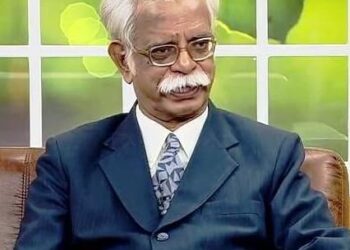Indian Constitution says ‘India is Union of States’. The governing powers are distributed exclusively with Union government and State governments and jointly too. Such powers are subject wise categorised as Union List, State List and Concurrent List of which the subject, ‘Education’ is at present in the Concurrent List (shifted from State List during the Emergency). Both the Union government and State governments are responsible for the development of education. But such responsibilities are complimentary and not contradictory. Education policy can be formulated in both the schools that are being run by them, those under their technical as well as administrative control. Apart from them education development schemes are implemented by them i.e. by centrally sponsored schemes for which financial contributions are shared by Union and State governments in the ratio of 60:40.
In Tamil Nadu, Uniform System of School Education has been in practice with due enactment since 2010. The State Board syllabus is prescribed for it. Since 1968, the Tamil Nadu State Government has been following the formulated bilingual policy of Tamil and English as language subjects for which due resolutions were passed in the State Legislative Assembly and notified in the Government Gazette.
The Union Government has formulated New Educational Policy 2020 wherein 3-language formula has been sustained. The State of Tamil Nadu has not accepted the New Educational Policy, including the 3 – language policy for various reasons. In this background three centrally sponsored schemes were implemented before 2020 – the year in which the New Education Policy was formulated by the Union government. The three schemes are:
i) Sarva Shiksha Abhiyan (SSA)
ii) Rashtriya Madhyamik Shiksha Abhiyan (RMSA)
iii) Teacher Education (TE)
All these three schemes were implemented even prior to formulation of New Educational Policy and the financial allocations were shared in the ratio of 60:40 by the Union and the State Government of Tamil Nadu. In the Union budget 2024-25, funds allocations were made to States and an amount of Rs.2,152 crores was earmarked for the schemes. The financial year is nearing its end 31st March 2025. So far the share amount of the Union government has not been released to Tamil Nadu. However, the Tamil Nadu State has spent its share since the scheme has been implemented for many years in the past.

When the financial allocation for the said schemes have been made, the Union government is laying a condition, for the release to Tamil Nadu, to accept the New Educational Policy 2020. Can such a condition be valid constitutionally? The people of all the States are paying taxes to the Union government and the devolution of the taxes, to the State is a must. ‘Education’ comes under ‘Concurrent List’. The New Education Policy is only a policy formulated by the Union Government. It cannot compel the States to accept it since school and pre school education come under the purview of the State governments. The Union Education Minister insisting on the acceptance of NEP 2020 for the release of share of funds to Tamil Nadu is ridiculous with scant respect to the Constitution. When Tamil Nadu State government had already conveyed to the Union government about non acceptance of NEP 2020, is it proper for the Minister to lay such a condition? The education policy cannot be linked with the allocation of funds. The right of the States to stake their claim for the devolution of taxes from the Union is as per the federal polity envisaged by the Constitution. The responsible persons who swore on Indian Constitution while assuming office cannot violate it and act in a disrespectful manner. The minister says – “When all other States have accepted NEP 2020, Tamil Nadu should also accept it”. This is absolutely unfair, unjust and dictatorial.
Compelling NEP 2020 is Contrary to Constitution:
Every State has its own right to formulate or adopt any education policy. The rulers assuming authority through democratic mode are vested only with the right to formulate their own schemes which are viable for the progress and prosperity of their people. It is the Constitutional obligation to discharge duty to the people who have given them mandate to rule the State.
In the NEP 2020, three language learning is made compulsory which is against the two language policy of Tamil Nadu i.e. Tamil and English. The Union government says, it is for 3 – languages i.e. mother tongue, English and any one Indian language. This 3 – language policy has been consistently insisted and said to be implemented in other states. What is the net effect of the 3 – language policy? Practically it is 2 language policy in the Hindi speaking Northern States (learning Hindi as third language does not arise at all). Tamil Nadu has attained many heights in education comparatively. This has happened due to the 2 – language policy for the past 60 years. Tamil Nadu is justified in its stand of the language policy as well as continuing the same even when 3 – language policy is insisted through accepting NEP 2020. 22 Indian languages have been placed in the VIII Schedule of Indian Constitution. Apart from Hindi and Sanskrit many Indian languages are placed. As per the Schedule no speciality is accorded to any one or a few languages among them.
All the languages except Sanskrit are spoken by a sizeable population of our country. As per the latest enumeration, only less than 25,000 people speak Sanskrit mainly in academic and research fields and in chanting of mantra at the time of prayers. Though the Union Government says it is for any Indian language as the third one, practically it would favour only Hindi and Sanskrit. Will it announce openly, the third languages that are being taught in schools in Hindi speaking states? Practically there is no third language for them; if exactly ascertained, it is only one language – Hindi. The second language English is only on paper. With such an experience in the implementation of the 3 – language policy, how could the Union government insist the Tamil Nadu to accept it through the NEP 2020? There is no mention of 3-language policy in the Constitution for its adherence. Every State could formulate its own language policy. The State of Tamil Nadu did it as 2 – language way back in 1968. This policy has yielded fruitful results. Many of the students who studied under 2 – language policy in Tamil Nadu have reached significant positions in their career throughout the world.
The integral feature of our country is ‘Unity in Diversity’. But the BJP led Union government under the guise of uniformity tries to impose Hindi and Sanskrit. Even in the Northern States like Uttar Pradesh, Bihar, Madhya Pradesh, many dialects spoken by the people like Bojpuri, Mythili etc have lost significance due to the imposition of Hindi. Recently the position of Urdu has been replaced in Rajasthan with Sanskrit, that is spoken by negligible population. What purpose does the 3 – language policy serve? Only to curtail the fund allocation for the State and impose Hindi and Sanskrit under the guise of 3 – language formulas of NEP 2020. Such a question arose in the states ruled by parties other than the BJP. Is it not unconstitutional on the part of the BJP led Union government to advocate NEP 2020 compulsorily? No intrusion into the domain of governance of states can any longer be tolerated.









